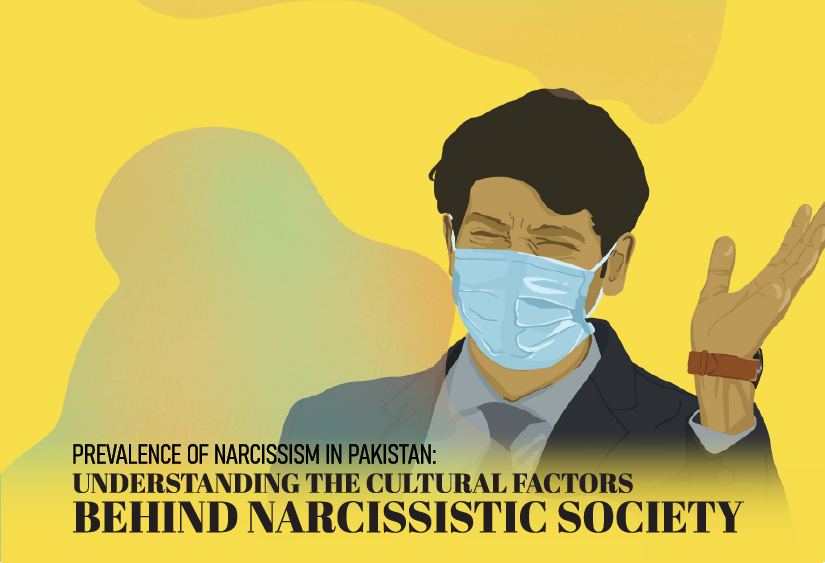
Article by
Narcissism, characterized by grandiosity, self-centeredness, and a lack of empathy, is a personality trait that has been found to be prevalent in various cultures around the world. In Pakistan, the issue of narcissism is particularly pronounced, with cultural factors such as male dominance, gender discrimination, and racism playing a significant role in its prevalence. Understanding the roots of narcissism in Pakistani culture is crucial in addressing and combating this harmful personality trait. This blog explores the cultural factors behind narcissism in Pakistan and the implications it has on individuals and society as a whole.
Before delving deeper into the cultural factors contributing to narcissism in Pakistan, it is essential to have a clear understanding of what narcissism entails. Narcissism is a personality disorder characterized by an inflated sense of self-importance, a constant need for admiration, and a lack of empathy towards others. Individuals with narcissistic traits often exhibit behaviours that prioritize their own desires and needs above all else, disregarding the feelings and rights of those around them. By defining narcissism, we can better grasp how it manifests within the Pakistani cultural context and identify ways to address and mitigate its effects on individuals and society.
Understanding the cultural factors that contribute to the prevalence of narcissism in Pakistan is crucial for addressing this issue effectively. In a society where hierarchical structures and notions of prestige influence social interactions, individuals may strive for grandiosity and admiration to secure their status. Moreover, societal expectations emphasizing success, material possessions, and external validation can fuel narcissistic tendencies in individuals. The interplay of collectivist values with individualistic pursuits also plays a significant role in shaping narcissistic behaviors within the cultural context of Pakistan. Exploring these factors will provide insight into the root causes of narcissism in Pakistan and guide interventions to foster healthier interpersonal dynamics.
The role of social media cannot be overlooked when discussing the prevalence of narcissism in Pakistan. With the growing use of platforms like Instagram and Facebook, individuals are constantly exposed to curated images of success, beauty, and perfection. This perpetuates a culture of comparison and the pursuit of external validation, which are key aspects of narcissistic behavior. Additionally, the ease of creating a persona online that portrays an idealized version of oneself can further inflate narcissistic tendencies in individuals seeking admiration and validation from their online presence. Understanding the impact of social media on narcissistic tendencies is vital in devising strategies to promote authenticity and self-worth in a digital age.
Exploring family dynamics in Pakistan can provide valuable insights into the development of narcissistic traits. Research suggests that parenting styles, such as overindulgence or neglect, can contribute to the manifestation of narcissistic behavior in individuals. In a culture where respect for elders and authority figures is paramount, children raised in environments that lack healthy boundaries and opportunities for self-expression may seek validation and attention through narcissistic tendencies. It is essential to examine the interplay between familial relationships and the reinforcement of narcissistic traits to effectively address this issue within the cultural context of Pakistan. Understanding these dynamics can lead to interventions that promote healthier patterns of interaction and self-esteem development.
Recognizing narcissistic behaviors in oneself or others can be a crucial step towards initiating positive change. Symptoms such as a constant need for admiration, lack of empathy, and an inflated sense of self-importance are indicators of narcissism. In a Pakistani cultural setting, where these traits may be normalized or even reinforced, it is essential to foster awareness and open dialogue about the detrimental effects of such behavior. Through psychoeducation, therapy, and support systems, individuals exhibiting narcissistic tendencies can work towards developing healthier relationship dynamics and improving emotional intelligence. By addressing these behaviors proactively, we can promote a more empathetic and harmonious society in Pakistan.
Understanding the cultural factors contributing to narcissism in Pakistan is a critical step in fostering a more empathetic society. By acknowledging and addressing narcissistic behaviors, individuals can begin the journey towards personal growth and healthier relationships. It is imperative for communities to promote self-awareness, empathy, and emotional intelligence to combat the negative impacts of narcissism. Through continued education, therapy, and supportive environments, we can cultivate a culture that values humility, compassion, and genuine connection. Let us collectively strive towards creating a society where empathy and understanding prevail, paving the way for a harmonious and compassionate Pakistan.
 Monthly "Azeem English Magazine", launched in 2000, records the information about diverse fields like mental health, literature, research, science, and art. The magazine's objective is to impart social, cultural, and literary values to society.
Monthly "Azeem English Magazine", launched in 2000, records the information about diverse fields like mental health, literature, research, science, and art. The magazine's objective is to impart social, cultural, and literary values to society.
+92 51 88 93 092
First Floor, RAS Arcade, Eidhi Market, Street#124, G-13/4, Islamabad, Pakistan, 44000.